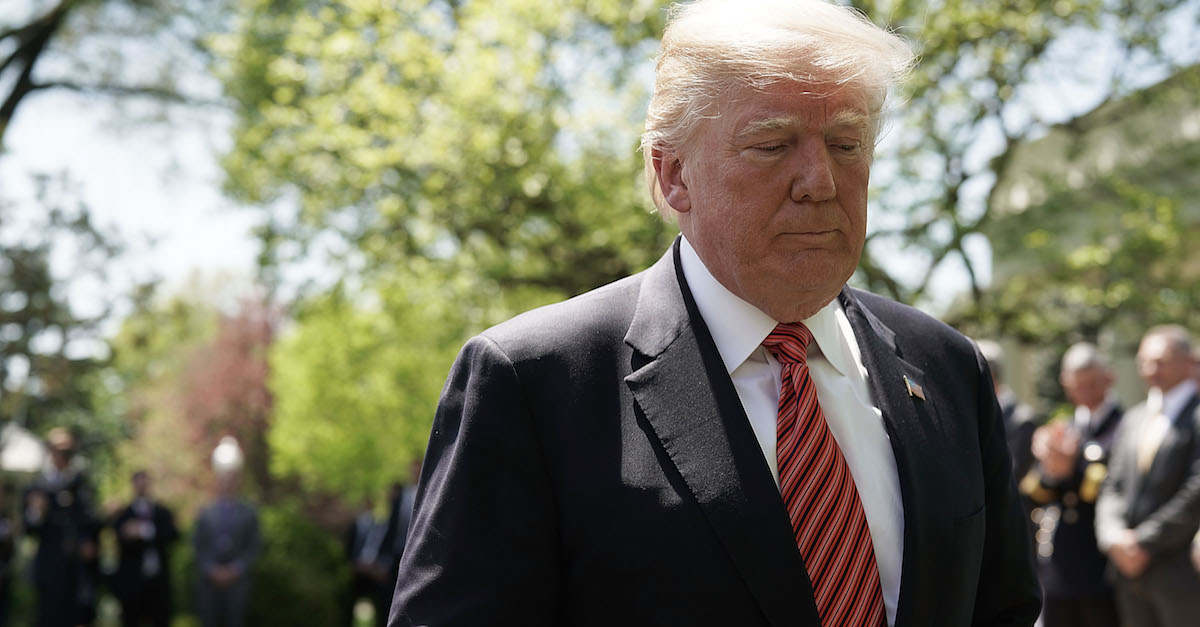
A federal judge ruled Wednesday morning that President Donald Trump may not block his critics on Twitter. Many of those critics must now be unblocked.
Such blocking activity, performed by a public official–even the president of the United States of America–runs afoul of the First Amendment, the court said.
In a 75-page order, U.S. District Judge Naomi Reice Buchwald concisely began her lengthy analysis with the following emphatic finding of the law:
This case requires us to consider whether a public official may, consistent with the First Amendment, “block” a person from his Twitter account in response to the political views that person has expressed, and whether the analysis differs because that public official is the President of the United States. The answer to both questions is no.
Buchwald’s summary analysis continues, “We hold that portions of the @realDonaldTrump account — the ‘interactive space’ where Twitter users may directly engage with the content of the President’s tweets — are properly analyzed under the ‘public forum’ doctrines set forth by the Supreme Court, that such space is a designated public forum, and that the blocking of the plaintiffs based on their political speech constitutes viewpoint discrimination that violates the First Amendment.”
The Supreme Court’s public forum doctrine is easily understood and this case lays it out fairly simply. The basic idea centers around the notion that certain places (whether physical or digital, or in the court’s quoted words, “metaphysical”) have, by tradition or practice, been used by the general public for speech-related purposes and should, therefore, remain that way–and thus remain free of government interference. Under Supreme Court jurisprudence there are three types of public forums: (1) traditional; (2) designated or limited; and (3) closed.
Here, the court found that President Trump’s Twitter account was a designated public forum because anyone can view Trump’s tweets, because anyone with a Twitter account can follow Trump’s tweets, because anyone who is not blocked on Twitter can interact with Trump’s tweets, and because White House Social Media Director (and co-defendant) Dan Scavino said, “[Twitter is how President Trump] communicates directly with you, the American people!” The court found Trump’s account was not a traditional public forum because Twitter is a relatively new technology and people have not relied upon it “for public speech and debate since time immemorial.” A closed forum analysis wasn’t really attempted here.
Trump and Scavino unsuccessfully argued that blocking users wasn’t government action because everyone on Twitter has the same ability to block other users. This argument was rubbished and dismissed by the court as not in line with Supreme Court precedent. Additionally, the court noted that by blocking users, the government was acting like a property owner and the context of the property matters. Here, President Trump uses his Twitter account as a designated public forum. End of inquiry.
Thus, the president’s blocking of Twitter users constitutes a government regulation on speech, the court said.
In order for a government institution–that is, the president and/or his social media guru–to limit the free exercise of speech at a designated public forum, the government must narrowly tailor its regulations in order “to achieve a compelling state interest.” Here, that didn’t happen, nor was it even attempted. Rather, the plaintiffs were summarily blocked for what U.S. courts term “viewpoint discrimination.” That is, Twitter users were blocked because they disagreed with, criticized, or otherwise upset President Trump. Viewpoint discrimination is impermissible in either traditional or designated public forums and does not serve a compelling state interest.
Trump and Scavino unsuccessfully argued that Trump’s First Amendment rights would be violated by not being able to choose who he associated with and because it wasn’t the government’s job to promote viewpoints critical of the government. While allowing that both of those arguments were technically true, Judge Buchwald noted that they didn’t really have anything to do with the case before the court–and in any event, President Trump could just mute his critics instead of blocking them.
Buchwald clarified, “In sum, we conclude that the blocking of the individual plaintiffs as a result of the political views they have expressed is impermissible under the First Amendment. While we must recognize, and are sensitive to, the President’s personal First Amendment rights, he cannot exercise those rights in a way that infringes the corresponding First Amendment rights of those who have criticized him.”
As for relief and redress, Buchwald declined to enter the plaintiffs’ requested injunction against Trump–for now, at least. In the present case, the plaintiffs asked for both declaratory and injunctive relief. That is, a declaration of their First Amendment rights as they relate to Trump’s unlawful blocking and a written order demanding Trump unblock them.
Instead, the court entered a declaratory judgment which all but requires Dan Scavino to unblock the individual plaintiffs named in the case. Buchwald noted:
Because no government official is above the law and because all government officials are presumed to follow the law once the judiciary has said what the law is, we must assume that the President and Scavino will remedy the blocking we have held to be unconstitutional.
In other words, Judge Buchwald is trusting that Trump and his social media team won’t take part in a constitutional crisis by ignoring the lawful order of a federal court. If they don’t comply, an injunction against the president himself may be in the offing sometime soon. We’ll see.
[image via Alex Wong/Getty Images]